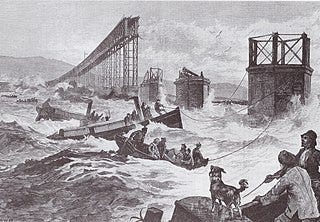The Tay Bridge disaster occurred during a violent storm on Sunday, the 28th December 1879, or four days after Christmas Eve, when the newly built, enormously expensive, over 3000 meters long first Tay Rail Bridge collapsed as a North British Railway (NBR) passenger train on the Edinburgh to Aberdeen Line from Burntisland bound for Dundee passed over it, killing all 75 aboard.
About a month after the accident, German poet Theodor Fontane (1819 - 1898) published a Ballad about this tragedy.
He wasn't the only one to do so,
but I prefer Fontanes work for multiple reasons:
One, he invokes a line from William Shakespeare's Macbeth, together with the image of the three witches, who, embodying the forces of nature, wreak the disaster:
When shall we three meet again?
In thunder, lightning, or in rain?
When the hurlyburly's done,
When the battle's lost and won.
Two, he pits nature against man and man against nature, which seems to have been a theme in the beginning of the Industrial age.
Three, he offsets this struggle for supremacy (which arguably we consider won by now, though terrified by the result and the resultant responsibility, which we desire to shed by either returning to the status quo ante or, otherwise, dehumanizing ourselves into industrial entities) with a - most probably fictional - Christmas family tragedy.
And last but not least, for that iconic line
"Tand, Tand ist das Gebilde von Menschenhand"
cast as the witches' spell, which translates into: "Anything produced by human hands (and mind) is but flitter, baubles, trinkets" and will not stand the test of time, but crumble to dust at the first contact with the forces of reality, here:
"Vain, vain, is the work of man."
Or, as expressed by Terry and Renny Russel in "On the Loose", Sierra Club Ballantine Books, 1969-71:
Thine alabaster towns will tumble.
Thine engines rot into dust.
Man will break his date with the future.
No matter how long he wants to play outlaw, no matter how long he wants to gallop through town, shooting like a madman and hooting the laws of nature's God.
It is not they he has made obsolete.
It is himself.
This knowledge is called wisdom.
Taken from the log book of the BAND "Hawkwind" circa 1971.
There is also a fictionalized account of both the erection and the collapse of the daring construction, from a civil engineer's point of view, by German engineer and writer Max Eyth (1836-1906), who I highly recommend to all those who wish to know more about that, somewhat lost, time of the beginning of the heydays of European engineering. Things have not changed. Much.
But now for the enhanced machine translation (and they are getting frightfully good at it!) of the Ballad
The Bridge on the Tay
by Theodor Fontane (1819-1898)
1879
"When will the three of us meet again?"
"Around the seventh hour, at the bridge's dam."
"On the central pillar."
"I'll extinguish the flame."
"Me too."
"I'll come from the north."
"And I from the south."
"And I from the sea."
"Hey, there'll be a merry-go round,
and the bridge must go into the ground."
"And the train on the bridge
at the seventh hour?"
"Hey, that has to come too."
"Must go."
"Vain, vain, is the work of man."
On the northern side, the bridgekeeper's house -
all windows face south,
and the bridgekeeper's people, with unrest and fear
look to the south,
to see and wait if there's not a light
saying "I'm coming" across the strait,
"I come, in spite of the night and storm flight,
I, the Edinburgh train."
And the bridgekeeper now: "I see a glow
on the other shore. That must be him.
Well, mother, away with your anxious dream,
our Johnie is coming to see his tree,
and what else is left on the tree of lights.
Light everything like on the holy night of Christ,
who will be with us twice this year, -
in eleven minutes he will be here."
And it was the train. By the southern tower
it's panting past now against the storm,
and Johnie speaks: "The bridge, still!
But what does it matter, force it we will.
A solid kettle, a double steam,
will remain victors in such a fight,
and no matter how they race and wrestle and rage,
we'll wrestle them down: the elements.
And our pride is our bridge;
I laugh, as I think back to fore
to all the misery and all of the need
with the miserable old boat;
how many a dear Christmas night
I spent in the ferry house
and saw in our windows the bright light
and counted and couldn't be over there."
On the northern side, the bridgekeeper's house -
all windows face south,
and the bridgekeeper's people, with unrest and fear
look to the south,
for the winds did play more angrily,
and now, as fire falling from the sky,
glowing in shooting down splendor
above the water below... And again it is night.
"When will the three of us meet again?"
"At midnight, on the mountain's crest."
"On the high moor, by the alder tree."
"I'll come."
"Me too."
"I'll tell you the number."
"And I'll tell the names."
"And I the torment."
"Hey! Like splinters the beams broke in two."
"Vain, vain, is the work of man."



